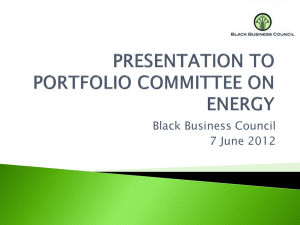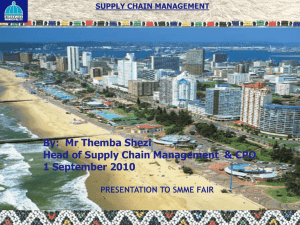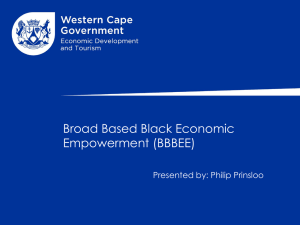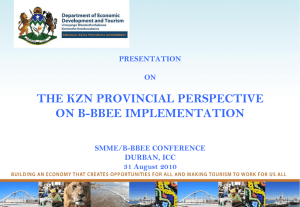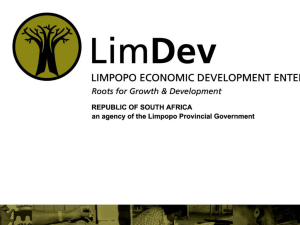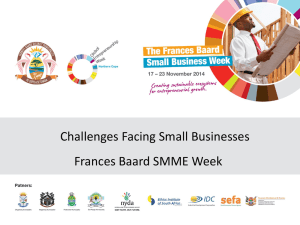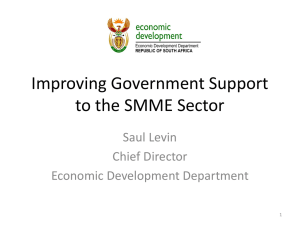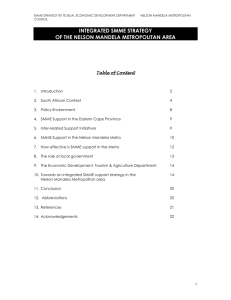presentation
advertisement
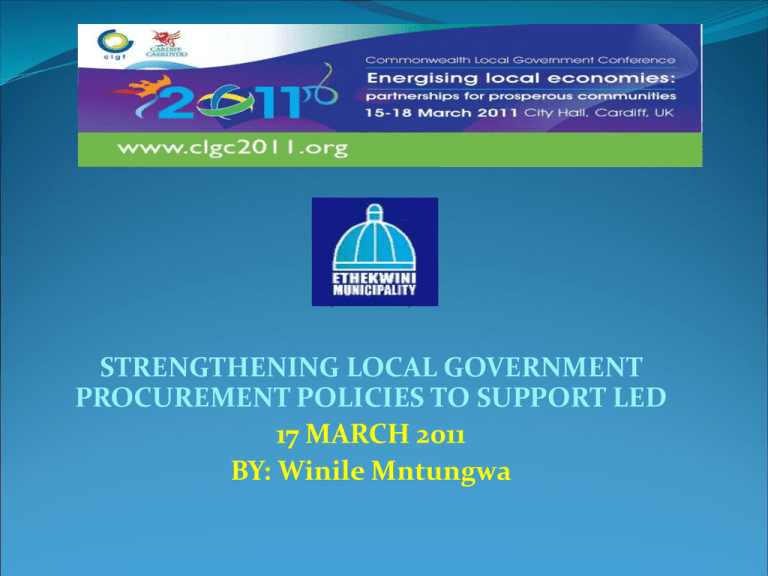
(SEW) STRENGTHENING LOCAL GOVERNMENT PROCUREMENT POLICIES TO SUPPORT LED 17 MARCH 2011 BY: Winile Mntungwa BACKGROUND PREVAILING FACTOR Local government is major procurer of services in local community……… PROBLEM STATEMENT How the eThekwini Municipality (EM)has used/uses procurement to support LED in the local community? CURRENT SUPPLY CHAIN MANAGEMENT (SCM) FRAMEWORK OF EM From the existence of the Preferential Procurement Policy Framework Act (PPPFA) No.5 of 2000, Preferential Procurement Regulations followed in 2001, which gave guidance for the implementation of the said act. EM developed it’s own Targeted Procurement Policy which was adopted by Council in June/July 2003. This changed the way we recognized Targeted Businesses and allocation of preferential points. For all tenders with the rand value from R30K up to R500K, 20 points are allowed for preferential status and the remaining 80 points for the price and functionality. For all tenders with the rand value above R500K, 10 points are allowed for preferential status and the remaining 90 points for the price and functionality. New outlook of preferential procurements points allocation to HDI companies or subcontracting to HDIs and other new categories of recognition. ACRONYM DEFINITION Historically Disadvantaged Individual (HDI) : Includes Black, Women, and Disabled Individuals and preference has been given to all these target groups who, due to the apartheid policy that had been in place, had no franchise in national elections prior to the introduction of the Constitution of the Republic of South Africa, 1983 (Act no 110 of 1983) or the Constitution of the Republic of South Africa, 1993 (Act No 200 of 1993) (the Interim Constitution). Provided that a person who obtained South African citizenship on or after the coming to effect of the Interim Constitution, is deemed not to be an HDI. Priority Population Group (PPG): Black Individuals who fall into population groups that were not offered a franchise in the national elections before or after the introduction of the 1984 tricameral parliamentary system and only received a franchise during 1994. That exclusion had a major negative bearing on their lives therefore, resulting in them being worse affected in terms of poverty levels, unemployment and/or unfulfilled basic needs (Water, Electricity, Housing & Sanitation). Black Business Enterprise (BBE): At least 26% Black Owned in terms of equity and voting rights/powers, with a corresponding management representation at all levels. Priority Business Enterprise (PBE): At least 26% Owned by individuals which are from the Priority Population Group in terms of equity and voting rights/powers, with a corresponding management representation at all levels. ACRONYM DEFINITION…..cont Women Business Enterprise (WBE): At least 26% Women Owned in terms of equity and voting rights/powers, with a corresponding management representation at all levels. See below, for various categories of ownership and management. SMME’s : Are Small, Medium & Micro Enterprises Local Content/Resources/Businesses: Local Resources for the purposes of this policy is EThekwini Municipality Area first, KZN second and SA third and where applicable, Africa fourth. Participation Goals: Participation goals and preferences are set for companies who meets the minimum requirements in terms of a Balanced Score Card as stipulated in the Department of Trade and Industry’s Broad Based Black Economic Empowerment Strategy. This will apply mainly to major contracts and/or engagements. Payment to SMME`s (EARLY PAYMENT CYCLES) SMME`s within the Very Small and Micro categories are paid within 14 days of receipt of approved invoice. All other payments are to be within 60 days from date of delivery or in the NEW CATERGORIES OF RECORGNITION Historically Disadvantaged Individuals (HDIs) Priority Population Group (PPGs) Black Business Enterprise (BBE) Priority Business Enterprise (PBE) Women Business Enterprise (WBE) Small, Medium & Micro Enterprises (SMME’s) Local Content/Resources/Businesses Other Preferential Arrangements include the following Participation Goals: Payment to SMME`s: 14 days vs 4 weeks (30 days) DEFINITIONS OF COMPANY OWNERSHIP RECORDNITION LEVELS Influenced Company: when ownership is between 26% and 50%, with corresponding management representation at Board, Executive and Operational levels. Empowered Company: when ownership is between 51% and 75%, with corresponding management representation at Board, Executive and Operational levels. Substantially Owned Company: is between 76% and 100%, with corresponding management representation at Board, Executive and Operational levels. CONTRACTS /TENDER ADJUDICATION METHODS USED BY ETHEKWINI MUNICIPALITY For all values = or < R500 000 80/20 scoring is used: 80 points are for the price & functionality and 20 points for the preferential/BEE status For all values > R500 000: 90/10 where 90 points are for the price & functionality and 10 points for the preferential/BEE status EM were the first to include Priority Population Group and PBE’s in their policy to address the skewed results achieved prior to this policy. This policy was hailed as the best policy in the country and very progressive. Through this policy a lot has been achieved in terms of the Economic Transformation as would be seen from the figures shown in the achievements slide. THE JOURNEY ACHIEVEMENTS TARGETED PROCUREMENT ADJUDICTAION FRAMEWORK RATING : < R500K NO 1 2 3 4 5 6 CRITERIA Competency, Specialist input & experience of consultant/service provider (25) Understanding of the brief, originality & relevance (25) Capacity to deliver the required quality within the specific timeframe (20) Price (Budget) (10) EMPOWERMENT SMME Location Ownership (20) Total Scores (100) SCORING REMARKS TARGETED PROCUREMENT ADJUDICTAION FRAMEWORK RATING : > R500K NO 1 2 3 4 5 6 CRITERIA Competency, Specialist input & experience of consultant/service provider (30) Understanding of the brief, originality & relevance (25) Capacity to deliver the required quality within the specific timeframe (20) Price (Budget) (10) EMPOWERMENT SMME Location Ownership (10) Total Scores (100) SCORING REMARKS INTERPRETATION OF THE RESULTS There has been significant improvement and progress made since year 2002/3 to 2009/10 as evidenced by the following movements : PBE’s moved from R15m in 2002/3 to R1057m in 2009/10. BBE’s moved from R207m in 2002/3 to R1798m in 2009/10. WBE’s moved from R15-38m in 2002/3 to R1007m in 2009/10. SMME’s moved from R207m in 2002/3 to R2298m in 2009/10. Local Businesses moved from R8-38m in 2002/3 to R2598m in 2009/10. CATEGORIES OF PROCURED GOODS AND SERVICES INFRASTRUCTURE SPEND Electricity: contractors and maintenance, Substation contract and switch gear, Electrical accessories , Electrical cabling, lighting, Information technology, sewage, Water Engineering Housing Solid Waste Real Estate services MATERIALS MANAGEMENT BUYING Furniture, protective clothing, hardware supplies, stationery, catering (food and beverages), logistics, education & training services, health & social services, protective clothing, petroleum, business services and many more BACKGROUND BLACK ECONOMIC EMPOWERMENT (BEE) Since 1994: BEE was a major thrust of all government policies YET there was no coherent strategy for its implementation. In 2000: BEE Commission released a report which gave the first attempt at broadly defining BEE. The BEE Commission’s report laid a good foundation for the development of strategy towards the implementation of BEE. In 2003: a strategy for BEE was released which defined BEE as: An integrated and coherent socio-economic process that directly contributes to the economic transformation of the country and brings about significant increases in the numbers of black people that manage, owned and control the country’s economy, as well as significant decreases in income inequalities. Thus the BEE process will include seven (7) elements of the scorecards: Ownership, Management Control, Employment Equity, Skills Development, Preferential Procurement, Enterprise Development as well as Socio-Economic Development. KZN Provincial BEE STRATEGY Vision: A deracialized provincial economy in whose mainstream a critical mass of Black people participate meaningfully, in terms of control and ownership of private sector enterprises, and hold operational, professional, management, and executive positions in organizations of both the private and public sectors, in proportion to their demographic weight. STRATEGIC GOALS ARE: Increase in the number of black people who have ownership and control of existing and new enterprises ( in priority sectors). Increase number of Black people who hold senior management and executive positions in enterprises. Increase in the proportion of the ownership and management of economic activities vested in community-based and broad-based associations and enterprises, collective enterprises, trade unions and employee trusts. Increase in the number of Black young people, particularly rural young people, who acquire skills. Increase in land ownership by black people, etc. HOW DOES SCM FACILITATE BEE Developing an Empowerment Charter which will Describe Specific Empowerment Objectives for Different Types of Projects & Through Continued Enforcement of the City’s Procurement Priorities which are : Increased Usage of Local Resources By Setting Minimum Targets for Usage of Local Labour and Businesses Redressing of Skewed Employment and Ownership patterns through Black Economic Empowerment By Setting Minimum Targets for Broader Participation by Targeted Businesses through Packaging of Contracts Enforcing Panel Contracts Creation of Opportunities for Job Creation and Poverty Alleviation and Stimulation of Skills Development and Transfer By Targeting Certain Contracts for Compulsory Employment of the City’s Unemployed Youth and Graduates/Skilled Labour through Learnerships and Apprenticeships By Facilitating Incremental Implementing of EPWP By Facilitating Incremental Usage of Co-ops By Implementation of the Unit’s Trainee Program HOW DOES SCM FACILITATE BEE….cont Creation of Opportunities for Job Creation and Poverty Alleviation and Stimulation of Skills Development and Transfer By Targeting Certain Contracts for Compulsory Employment of the City’s Unemployed Youth and Graduates/Skilled Labour through Learnerships and Apprenticeships By Facilitating Incremental Implementing of EPWP By Facilitating Incremental Usage of Co-ops By Implementation of the Unit’s Trainee Program Fast-tracking the Growth and Ensuring Sustainability of SMME’s By Ensuring Enterprise Development through Setting the Targets for SMME’s Participation By Setting Minimum Requirement for Procurement of Goods and Services from SMME’s by Successful Contractors PRACTICAL CASE STUDIES Housing Projects Owners building own houses Skills development Stimulate Entrepreneurs Job Creation PRACTICAL CASE STUDIES… cont SMME Development Projects through various vehicles Local procurement of all resources SMME Fairs Empowerment Workshops Business Support Centres : Hives, incubators Cooperative Development Indigent group Skills development and business linkages Expanded Public Works Programme (EPWP) QUESTIONS AND ANSWERS DISCUSSION

